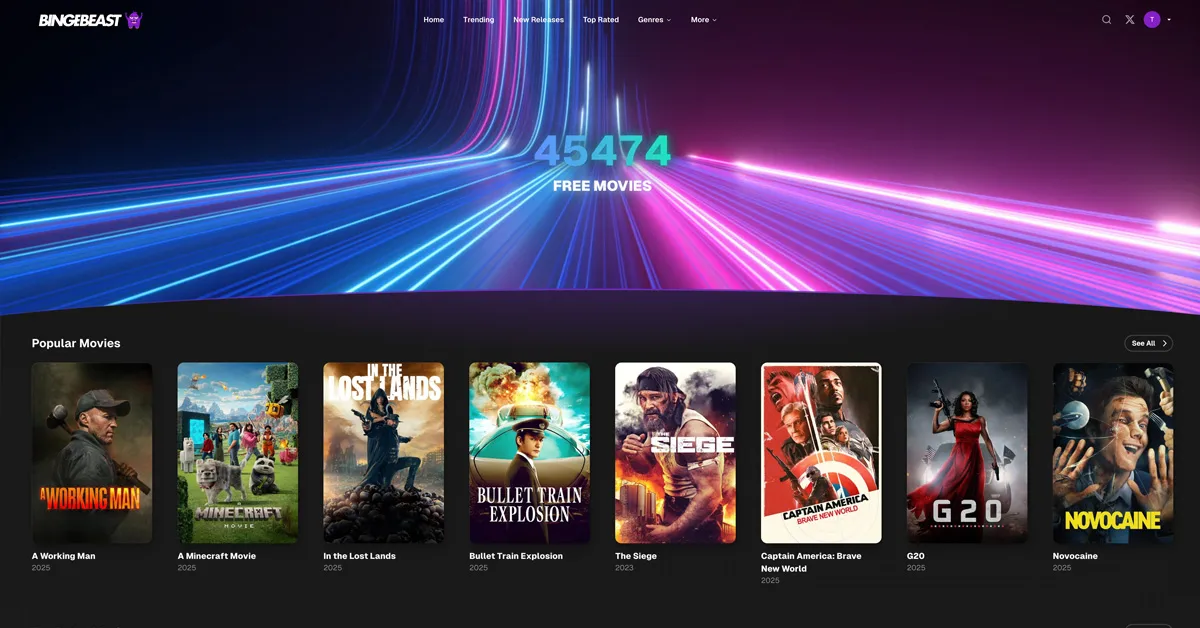The Rise and Fall of Streaming’s Promise
When streaming platforms first emerged, they promised a new golden age of entertainment. For a small monthly fee, users could access vast libraries of movies and TV shows from the comfort of their homes. It felt like the end of piracy—convenience, quality, and affordability made illegal downloads nearly obsolete. However, the optimism didn’t last. As competition intensified, the streaming market fractured, subscriptions multiplied, and costs skyrocketed. Today, viewers feel trapped by rising prices and content exclusivity, driving many back toward piracy.
One of the platforms standing out in this renewed landscape is BingeBeast. Unlike most free streaming services, BingeBeast is completely free, ad-free, and funded by voluntary donations, making it an appealing alternative for frustrated audiences. This unique model provides users with high-quality content without the intrusive ads that plague most other platforms.
Subscription Fatigue: Too Many Platforms, Too Little Value
The downfall of streaming’s convenience lies in the rise of subscription fatigue. Initially, a single subscription covered most major shows and films. Today, every studio wants its own platform—Disney+, Netflix, Hulu, HBO Max, Paramount+, Peacock, and countless others. The average household must now pay for five or more services just to keep up with popular content.
What was once a cost-effective solution has turned into a financial burden. According to surveys, many viewers are cutting back subscriptions or cycling between platforms monthly. Yet this constant switching still leaves users feeling unsatisfied, as content remains locked behind paywalls.
The Fragmentation Problem
Another driving factor behind piracy’s resurgence is the fragmentation of content. A decade ago, most shows and movies could be found on one or two platforms. Today, fans of Marvel, Star Wars, anime, or HBO dramas often need multiple subscriptions to follow their favorite franchises. This exclusivity strategy was designed to boost revenue, but it has alienated consumers instead.
The result is simple: when people can’t find all the content they love in one place, they look for alternatives. Sites like those listed in this free movie streaming directory have gained traction because they provide access to a broad selection without constant switching or high costs.
Ads on Paid Platforms: The Final Straw
Adding insult to injury, many streaming services now charge users for subscriptions while also showing ads. Netflix and Disney+ have recently rolled out ad-supported tiers, further frustrating audiences who believed streaming was supposed to eliminate commercials.
This shift is pushing even more users toward piracy. After all, why pay $15 per month and still endure ads when ad-free, free alternatives exist? This is where BingeBeast’s model shines. By operating through voluntary donations rather than intrusive advertising, it offers a cleaner, smoother experience than both legal and illegal competitors.
The Ethical Gray Zone of Piracy
Piracy has always been controversial. On one hand, it deprives creators of revenue; on the other, it highlights systemic failures in content distribution. Consumers aren’t pirating because they don’t value entertainment—they’re doing it because the system no longer serves them. High subscription costs, limited accessibility, and international restrictions all push audiences toward piracy as an act of convenience and protest.
Interestingly, many creators and industry experts have admitted that piracy is partly a problem of access, not just cost. If people can’t legally watch a show in their region, they will find a way—legal or not.
How BingeBeast Fills the Gap
Unlike most free streaming services, which bombard users with pop-ups and malware-laden ads, BingeBeast is setting itself apart. Because it’s donation-supported, it doesn’t need to rely on invasive advertising to survive. This makes it more trustworthy, enjoyable, and user-friendly.
It’s rare for a platform to combine free, ad-free streaming with community-driven support, and this advantage makes BingeBeast a standout in the current entertainment landscape. Viewers frustrated by endless subscriptions and overpriced services find comfort in a platform that gives them control without strings attached.
Piracy as a Consumer Movement
It’s easy to paint piracy as purely illegal behavior, but the reality is more complex. In many ways, piracy has become a form of consumer resistance. Viewers are sending a clear message: “We’re tired of being exploited.” The rise of piracy isn’t just about saving money—it’s about demanding fairness, accessibility, and simplicity.
If streaming giants want to win back audiences, they must take this message seriously. Lower prices, bundled options, cross-platform accessibility, and ad-free experiences could all help rebuild trust. Until then, platforms like BingeBeast will continue to attract audiences looking for a better way.
The Future of Streaming and Piracy
The battle between streaming services and piracy isn’t new, but the current resurgence feels different. Consumers have more choices than ever, yet satisfaction has plummeted. Unless the industry changes course, piracy will remain an enduring fixture of digital entertainment.
BingeBeast offers a glimpse of what the future could look like—a world where audiences enjoy free, high-quality streaming without ads, while supporting the platform voluntarily. This balance between sustainability and accessibility could inspire a shift in how entertainment platforms operate.
Conclusion
Streaming services began as the solution to piracy but became the problem themselves. Greed, fragmentation, rising costs, and ads have driven audiences back to piracy in record numbers. Viewers are no longer willing to juggle a dozen subscriptions or pay premium prices for a diminished experience.
In this environment, platforms like BingeBeast thrive by offering a free, ad-free, and donation-supported alternative that respects users’ time and wallets. Until the major players learn from their mistakes, piracy will remain alive and well—reminding us that when corporations prioritize greed, audiences will always find another way.

